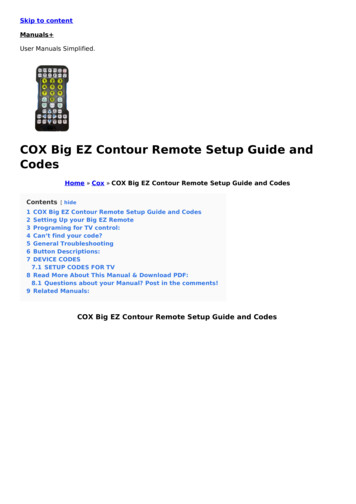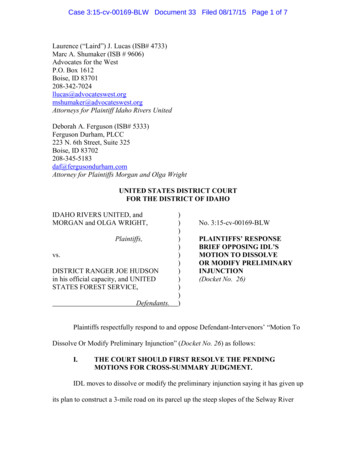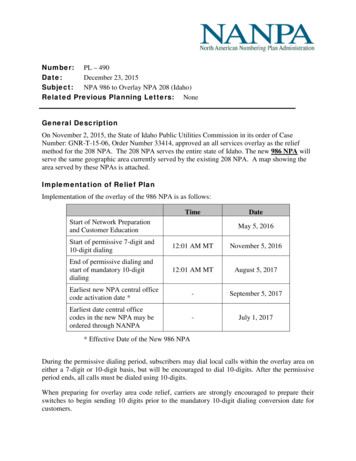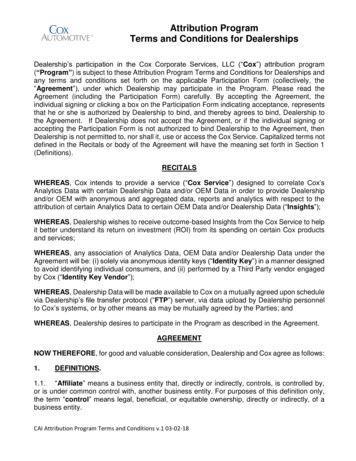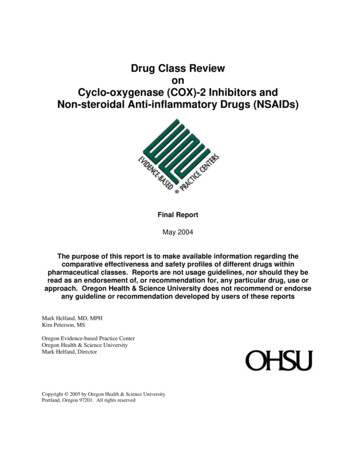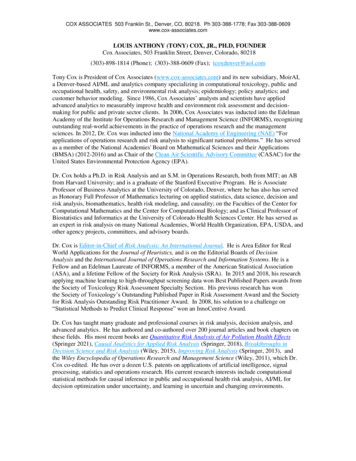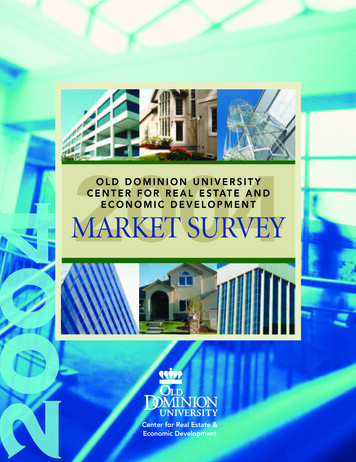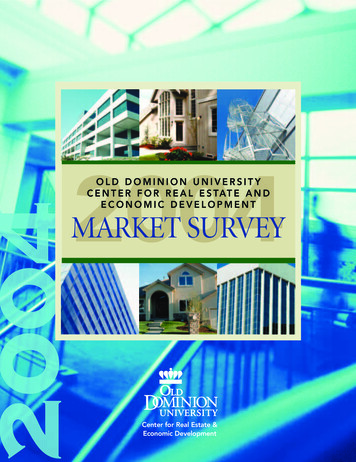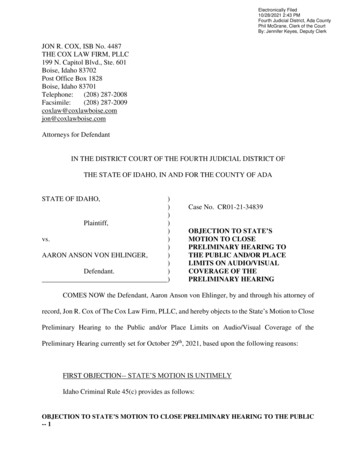
Transcription
Electronically Filed10/28/2021 2:43 PMFourth Judicial District, Ada CountyPhil McGrane, Clerk of the CourtBy: Jennifer Keyes, Deputy ClerkJON R. COX, ISB No. 4487THE COX LAW FIRM, PLLC199 N. Capitol Blvd., Ste. 601Boise, Idaho 83702Post Office Box 1828Boise, Idaho 83701Telephone:(208) 287-2008Facsimile:(208) ttorneys for DefendantIN THE DISTRICT COURT OF THE FOURTH JUDICIAL DISTRICT OFTHE STATE OF IDAHO, IN AND FOR THE COUNTY OF ADASTATE OF IDAHO,)))Plaintiff,))vs.))AARON ANSON VON EHLINGER,))Defendant.))Case No. CR01-21-34839OBJECTION TO STATE’SMOTION TO CLOSEPRELIMINARY HEARING TOTHE PUBLIC AND/OR PLACELIMITS ON AUDIO/VISUALCOVERAGE OF THEPRELIMINARY HEARINGCOMES NOW the Defendant, Aaron Anson von Ehlinger, by and through his attorney ofrecord, Jon R. Cox of The Cox Law Firm, PLLC, and hereby objects to the State’s Motion to ClosePreliminary Hearing to the Public and/or Place Limits on Audio/Visual Coverage of thePreliminary Hearing currently set for October 29th, 2021, based upon the following reasons:FIRST OBJECTION-- STATE’S MOTION IS UNTIMELYIdaho Criminal Rule 45(c) provides as follows:OBJECTION TO STATE’S MOTION TO CLOSE PRELIMINARY HEARING TO THE PUBLIC-- 1
Time for Filing Motions and Affidavits. A written motion, other than one which maybe heard ex parte, and notice of hearing must be served at least seven days before thetime specified for the hearing unless a different period of time is set by rule or by orderof the court. For cause shown such an order may be made on ex parte application. Whena motion is supported by affidavit, the affidavit us be served with the motion andopposing affidavits must be served at least one day before the hearing unless the courtpermits them to be served a later time (emphasis added).The motion in this case was received by Defense through electronic service after filing, at3:36 p.m. on the 26th of October, 2021, just two full business days prior to the scheduled hearing.The State has violated the requirements of I.C.R. 45(c) by its untimely filing and has notrequested from the Court relief from said rule with amotion to shorten time.SECOND OBJECTION-THE STATE’S REQUEST TO DENY THE PUBLIC FROMTHIS PRELIMINARY HEARING VOLATES BOTH THE UNITED STATES AND IDAHOCONSTITUTIONSThe First Amendment of United States Constitution states as follows:Congress shall make no law respecting an establishment of religion, or prohibiting thefree exercise thereof; or abridging the freedom of speech, or of the press; or the right ofthe people peaceably to assemble, and to petition the Government for a redress ofgrievances.The Idaho Constitution Article I Section 18. States as follows:JUSTICE TO BE FREELY AND SPEEDILY ADMINISTERED. Courts of justiceshall be open to every person, and a speedy remedy afforded for every injury ofperson, property or character, and right and justice shall be administered without sale,denial, delay, or prejudice.The Idaho Supreme Court in Cowles Publishing Co. v Magistrate Court of FirstJudicial District, 118 Idaho 753, 800 P2nd 640 (1990), discussed the issue of attempts topreclude the public from preliminary hearings in the connection with the Constitutionalguarantees of public access to judicial proceedings and found that “ public access toOBJECTION TO STATE’S MOTION TO CLOSE PRELIMINARY HEARING TO THE PUBLIC-- 2
preliminary hearings in Idaho plays a significant positive role in the functioning of the criminaljustice system.” Id. at p. 749,646.In its decision the Idaho Supreme Court relied on the decision handed down by the U.S.Supreme Court’s in Press-Enter. Co v Superior Court of California, 478 U.S. 1, 106 S. Ct.2735, 92 L.Ed.2d 1 (1986). (Press-Enter II) The US Supreme Court in the Press-Enter. IIdecision, reversed a California Supreme Court decision which held that there is no firstamendment right of public or press access to preliminary hearings. In Press-Enter. II, the SupremeCourt held in California there is a qualified first amendment right of access to preliminary hearingsand that the hearings cannot be closed unless specific findings are made on the record that asubstantial probability exists that the publicity will prejudice the defendant’s right to a fair trialand reasonable alternatives to closure cannot adequately protect the defendant’s fair trial rights.The Court held that the public right of access is not necessarily inconsistent with the defendant’sright to a fair trial, and observed, “[o]ne of the important means of assuring a fair trial is that theprocess be open to neutral observers. The right to an open public trial is a shared right of theaccused and the public, the common concern being the assurance of fairness.” (See Press-Enter.II Id. at 7, 106 S.Ct. at 2739) (emphasis added)The State in its motion to preclude the public from attending the preliminary hearingin this case attempts to assert two reasons therefor.First Reason-DEFENDNATS RIGHT TO A FAIR TRIAL“In the present case there is a substantial probability that allowing the media and thepublic to have access to the preliminary hearing-and in particular to the victim’stestimony-will prejudice Defendant’s right to a fair trial” (State’s memo at page 3).Although the Defense appreciates the State’s efforts to look out after the Defendant’sright to a fair trial. von Ehlinger wants nothing more than transparency as he exercises hisOBJECTION TO STATE’S MOTION TO CLOSE PRELIMINARY HEARING TO THE PUBLIC-- 3
right to a speedy and public trial. von Ehlinger is not concerned with public awareness of theallegations in this case as he has already been through a lengthy and very public Legislativehearing on the issues contained in this case that resulted in his resignation from the IdahoState Legislature. This media coverage in this case has been state wide as von Ehlinger hadformerly represented constituents in North Idaho.The State in its motion cites the potential for a defense motion to change venue andhow media coverage may play against their position on objecting to such a motion. Asindicated before von Ehlinger desires only transparency and is not afraid of the truth. Thiscase involves an alleged non-consensual sex act between von Ehlinger and the accuser. vonEhlinger has previously and publicly denied the accuser’s account of the circumstan cesbehind the allegations. The Defense does not anticipate to lay in wait in the event mediacoverage is prejudicially extensive and then spring a motion to change venue on the State.Even if that were to happen the Court will be tasked with making a decision on that issue at atime in the future and based on evidence presented to the Court that might support such amotion by Defense. To argue that denying the public access to a judicial proceeding that hasroutinely been open to the public, will somehow benefit von Ehlinger, as the State has, insupport of this motion would appear disingenuous.The Idaho Supreme Court in Cowles cited Press-Enter II. to support its reasoning asto why it is important for the public to have access to judicial proceedings:“The Supreme Court also determined in Press-Enter. II that there was a certain “therapeutic value”of openness.When the public is aware that the law is being enforced and the criminal justice system isfunctioning, an outlet is provided for these understandable reactions and emotions [provoked bycertain violent crimes]. . The value of openness lies in the fact that people not actuallyattending trials can have confidence that standards of fairness are being observed; the sureOBJECTION TO STATE’S MOTION TO CLOSE PRELIMINARY HEARING TO THE PUBLIC-- 4
knowledge that anyone is free to attend give assurance that established procedures are beingfollowed and that deviations will become known. Openness thus enhances both the basic fairnessof the criminal trial and the appearance of fairness so essential to public confidence in thesystem.’Id. at 13, 106 S.Ct. at 2742, (citations omitted) (emphasis in original).” Cowles Id. at646,759.The Idaho Supreme Court went on to state the following;‘In Idaho all of the concerns and considerations deemed significant by the Supreme Courtin Press-Enter. II are present when a preliminary hearing is held. The present case provides anexcellent example of when the preliminary hearing was the final and sole occasion for the publicto observe the criminal justice system. When the preliminary hearing was concluded theconspiracy count against Frazier was dismissed. Because the preliminary hearing was closed, thepublic was denied the opportunity to determine for itself whether the hearing was conducted fairlyand justice properly administered. Furthermore, the community “therapeutic value” of opennessmay also have been frustrated by not knowing what transpired at the preliminary hearing,particularly on the discussed portion of the complaint.Many criminal cases are dismissed by the magistrate following the preliminary hearing. Acriminal complaint that is open to the public has been filed in all of these cases, unlike the absenceof public filing when a grand jury convenes. Thus, when a preliminary hearing is closed the publicis denied the opportunity to observe the criminal justice system at work and is denied the assurancethat justice has been fairly and properly administered. We are of the opinion and hold that publicaccess to preliminary hearings in Idaho plays a significant positive role in the functioning of thecriminal justice system.Since preliminary hearings are presumptively open and considering that openness ofpreliminary hearings plays a significant positive role in our society, we hold that in Idaho aqualified first amendment right of public access attaches to preliminary hearings.’ Cowles Id. at646,759.von Ehlinger recognizes he has a right to a fair trial. He welcomes that right and isprepared to proceed in a public forum as is guaranteed by both the United States and IdahoConstitution’s.SECOND REASON-PROTECTING THE PRIVACY OF ACCUSERThe State further asserts the privacy of the accuser as a basis to violate the constitutionalguarantees to not only von Ehlinger but also the public. The State in its memo provides thefollowing as support for its position:OBJECTION TO STATE’S MOTION TO CLOSE PRELIMINARY HEARING TO THE PUBLIC-- 5
“In that case the issue at hand was the protection of the privacy of potential jurors in the case,and not the victim. Nevertheless, the principle still stands that portions of pretrial proceedingscan be properly closed to protect the privacy of persons other than the criminal defendant. In thiscase, the State has concerns about protecting the victim’s privacy. The victim of Defendant VonEhlinger’s crimes is a young woman whose identity and image should be protected andconcealed. It would be extremely unfair to require her to be seen, photographed, or recorded bythe media or members of the public simply because Defendant Von Ehlinger chose to perpetrateserious crimes upon her.1 It would similarly be unfair to allow the media or members of thepublic to learn her identity. Given the media attention that this case has received, it is at leastpossible that members of the media, upon learning her name and what she looks like, might tryto contact and interview her. Perhaps more concerning, news reports of proceedings at the Idaholegislature note that at least a small group of members of the public celebrated the fact that onelegislator revealed the victim’s identity around the time of legislative proceedings related to thecrimes now charged in this case. It is certainly a legitimate concern that members of such a groupmight harass the victim if her identity or likeness were made public in these proceedings. Giventhose concerns, closing the preliminary hearing in this case would be appropriate and permissibleunder the law. (States Memo at pg. 3-4)The Defense understands that the Media as a matter of policy does not broadcast orpublish the identity of accusers in sex offense cases. In that light the Defense does not have anobjection to the Court fashioning and order that would prevent such image capturing and ordisclosure. Defense is however not aware of any circumstance where the spoken words of theaccusations by the accuser have been ordered to be prohibited from public disclosure. It isinteresting to note that the accuser in this case has previously granted and interview to theAssociated Press. On May 4th 2021 the accuser spoke with Rebecca Boone of the AssociatedPress.Again, the States position and concerns for the accuser and her privacy is based on a“possibility” that she may be harassed by members of the media or the general public.1 As indicated earlier the Defense appreciates the States concern that von Ehlinger receive a fair trial. It wouldappear however that, based on the States representations here in support of its position, madam prosecutor has givenno credence to one of von Ehlinger’s most important rights at this stage of the proceedings, his presumption ofinnocence. It is disingenuous for the State to base their argument on parameters that do not exist. The presumptionof innocence held by a defendant is clear command law and is not diminished until a jury makes a finding, beyond areasonable doubt, of his guilt.OBJECTION TO STATE’S MOTION TO CLOSE PRELIMINARY HEARING TO THE PUBLIC-- 6
“Given the media attention that this case has received, it is at least possible thatmembers of the media, upon learning her name and what she looks like, might try to contact andinterview her. Perhaps more concerning, news reports of proceedings at the Idaho legislature notethat at least a small group of members of the public celebrated the fact that one legislator revealed thevictim’s identity around the time of legislative proceedings related to the crimes now charged in thiscase. It is certainly a legitimate concern that members of such a group might harass the victim if heridentity or likeness were made public in these proceedings.” (States Memo at pg. 4)As this Court is well aware, as is the State, there are provisions in the law that provide for thebasis of felony prosecution for any person who may attempt to intimidate or harass someone who isknown to be a potential witness in a criminal proceeding. (Idaho Code 18-2604).It is important to recognize that both rules of law found in Press-Enter.II and Cowleswere analyzed from the perspective of a Defendant’s right to a fair trial. Counsel for the Defensewas unable to locate any precedent that provides the same analysis from an accuser’s point ofview. Idaho Code section 19-5306 is the only statutory mention of rights afforded to those whoare alleged victims during the court process. Nowhere in that statutory provision does it providefor such individuals to be shielded, as to image or spoken word, from either the Defendant or thepublic, while participating in a Court proceeding.As is discussed above, Idaho Courts hold dear the Constitutionally guaranteed right of thepublic to witness and attend the judicial proceedings in this state. To deny access to the public at therequest of the prosecution based on the reasons set forth by the State do not rise to the level that suchconstitutional guarantees should be violated.CONCLUSIONThe States motion is untimely. Further, the State has failed to provide just reason for theCourt to enter an order that is violative of the US and Idaho Constitutions. The Defendant asks thatthe Court deny the States motion in its entirety.OBJECTION TO STATE’S MOTION TO CLOSE PRELIMINARY HEARING TO THE PUBLIC-- 7
DATED this 28th day of October, 2021.THE COX LAW FIRM, PLLCBy:JON R. COX, of the firmAttorney for DefendantCERTIFICATE OF SERVICEI HEREBY CERTIFY that on the 28th day of October, 2021, I caused to be served a trueand correct copy of the foregoing document upon the following individuals, by the methodindicated, and addressed as follows:Ada County Prosecuting Attorney’s Office200 W. Front Street, Rm. 3191Boise, Idaho 83702[ ] U.S. Mail, postage prepaid[ ] Hand Delivered[ ] Facsimile (287-7709)[ x ] eFile/Email:acpocourtdocs@adacounty.id.govJON R. COXOBJECTION TO STATE’S MOTION TO CLOSE PRELIMINARY HEARING TO THE PUBLIC-- 8
JON R. COX, ISB No. 4487 THE COX LAW FIRM, PLLC 199 N. Capitol Blvd., Ste. 601 Boise, Idaho 83702 Post Office Box 1828 Boise, Idaho 83701 Telephone: (208) 287-2008 Facsimile: (208) 287-2009 coxlaw@coxlawboise.com jon@coxlawboise.com Attorneys for Defendant IN THE DISTRICT COURT OF THE FOURTH JUDICIAL DISTRICT OF

